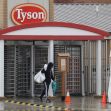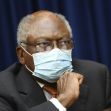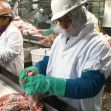Prompted by the deaths of at least 250 workers and the ripple effect of virus-spreading unsafe conditions at U.S. meat and poultry plants under the Trump administration, a House Subcommittee is investigating conditions that could have triggered over 54,000 coronavirus cases in twenty states. The investigation follows a report from the Centers for Disease Control and Prevention (CDC) that found meatpacking plants were a prime source for the “rapid transmission” of COVID-19.
The Chairman of the House Select Subcommittee on the Coronavirus Crisis, Rep. James E. Clyburn (D-S.C.) on February 1 wrote to the Occupational Safety and Health Administration (OSHA), the government agency charged with enforcing worker safety laws, and three major meatpacking plants. He asked each for documents that will be reviewed to “swiftly identify and rectify the previous Administration’s shortcomings to save lives” before vaccines are universally available.
A press release from Clyburn states, “Public reports indicate that under the Trump Administration, (OSHA) failed to adequately carry out its responsibility for enforcing worker safety laws at meatpacking plants across the country, resulting in preventable infections and deaths… OSHA did not fulfill its mission to protect vulnerable meatpacking workers during the pandemic.”
OSHA issued only eight citations and demanded less than $80,000 in penalties for safety violations by the meatpacking industry. Clyburn called this a “paltry amount,” noting that the parent company of Smithfield Foods, one of the companies under investigation, made a $925 million profit in the first half of 2020. Smithfield’s Chief Executive Officer (CEO) had a salary of $14 million the previous year.
The press release presented grim examples. When 1,294 workers at a Sioux Falls Smithfield Plant came down with coronavirus, OSHA fined Smithfield Foods only $13,494, less than $11 per affected employee. It also noted that more than two-thirds of meatpacking employees are Black or Hispanic. Many also lack adequate paid leave and so went to work while exhibiting signs of the virus.
Charging “callous disregard for workers’ health,” and refusal to “take basic precautions to protect their workers,” Clyburn sent letters to the CEOs of Smithfield Foods along with Tyson Foods and JBS USA, all sites of major outbreaks. The Select Subcommittee found 12,000 infected workers and 38 deaths at Tyson Foods; eight deaths and 3,500 cases at Smithfield Foods and 18 deaths and 3,000 cases at JBS USA.
Clyburn’s letter sharply criticized these companies for failing, in fact refusing, to “protect their workers, many of whom earn extremely low wages…” Facility-wide testing was not conducted, masks and shields were not always worn, and there were even allegations that Tyson managers in Iowa “were betting” on the number of coronavirus infections that workers would contract. The company later investigated the charges and terminated seven managers.
In addition, Bloomberg Law carried reports of JBS promising workers incentives such as “half of an Angus rib-eye” if they worked on weekends. At least one of them was told by plant healthcare workers that she was fine, even though she had a fever. She tested positive for COVID-19 a few days later. Two months after that, there were six deaths and more than 900 infections at her JBS plant in Cactus. Texas.
Clyburn then turned to the companies’ responsibility for the plant outbreaks that “have also spread to surrounding communities, killing many more Americans.”
His letter referred to CDC findings that called the plants “transmission vectors” and cited a study by the National Academy of Sciences that associated meatpacking plants with between 236,000 and 310,00 cases and 5,200 deaths.
The federal government also bears responsibility for the outbreaks, since it gave many meatpacking plants waivers that allowed them to increase line speed. Clyburn cited a Washington Post story that found plants with waivers had ten times more cases than plants who had not received them.
In April 2020 President Trump invoked a Korean War-era law that allowed meat processing plants to stay open “in order to protect the national food supply” and to alleviate what industry called a “strain on the supply chain.” This order came at a time when 3,300 workers had already contracted the disease and 20 had died.
Zack Corrigan, senior staff attorney with Food & Water Watch, a nonprofit consumer advocacy organization said, “What happened with COVID and meatpacking plants was an absolute abomination… It shows the worst parts of our food system and the power that big meat has in our political system, and it ultimately contributed to a great and acute public health problem.”
He explained that line speed is a key factor in disease spread. If employees are required to speed up production they are forced to commingle more in tight spaces. “That’s why you get folks together who can spread the disease,” he said.
The Select Subcommittee requested documents from the three meatpackers that related to employees’ complaints or concerns and explained how these complaints were tracked and resolved by February 15. The requests include: the number and description of unresolved complaints; all state and federal inspection reports, including results and citations or fines; and the number of employee deaths.
Worker rights groups applaud the Select Subcommittee’s investigation. Debbie Berkowitz, Worker Safety and Health Program Director for the National Employment Law Project said, “The meat industry aided and abetted by the Trump Administration’s OSHA and USDA (Department of Agriculture), failed to protect its workers and the surrounding communities in the pandemic. The industry’s business model depends on hiring the most vulnerable workers, such as refugees, who work long days in plants that are loud, cold, wet and at back-breaking speeds and too often afraid to speak up about unsafe conditions. Instead of retooling their factories, they spent money on full-page ads to scare people about meat shortages.”
Two of the meatpackers under investigation told National Public Radio (NPR) that they looked forward to providing information to the Subcommittee. Smithfield Foods cited the $700 million they have spent on employee protection and the “extraordinary measures” they took to protect their “team members.” The letter also and pointed to how they have met or exceeded all government health and safety guidance, including providing personal protective equipment, and slamming the media’s “inaccuracies and misinformation.”
Clyburn’s letter to Dean Banks, the current head of OSHA, made similar document requests after “strongly encouraging” the agency to comply with President Biden’s Executive Order on Protecting Worker Health and Safety and improving how it carried out its other statutory responsibilities. It reminded the current OSHA administration of the failings of the previous administration to “create an enforceable standard” by only suggesting “non-binding guidance that companies are free to ignore.”
Referring to the small amounts levied for health and safety violations, Clyburn reminded Banks that “Congress has made clear that penalty amounts should be sufficient to serve as a deterrent to violations. The few meager fines OSHA issued to meatpacking companies under the last Administration fell far short of that threshold.”
He told OSHA the Select Subcommittee’s hearings were being held because “A swift and forceful response” from OSHA could have led to stronger safety measures that prevented outbreaks and saved lives.
Corrigan did provide some comforting news. There are no immediate dangers to consumers from eating meat that came from the plants under review. He said there was no evidence of humans getting the novel coronavirus from meat products. However, he cautioned, there is a study that showed that swine are potential carriers of COVID-19. So, if infected animals come to the plants, inspectors, employees, farmworkers and transporters who are charged with handling the pigs before slaughter could get sick from the pigs.
Thus far, Corrigan said, not one company said they were reducing the amount of product they are producing. That means workers will have to keep on working closely together and close together means more chance of COVID-19 transmission.
Berkowitz sums it up this way, “The industry could have stepped up and mitigated the spread of COVID-19, but they did not. We applaud the committee’s investigation.”






